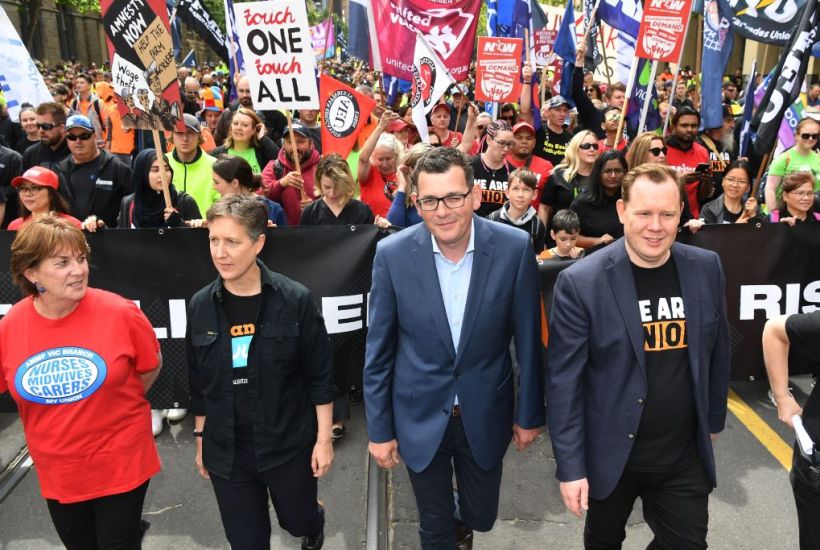The force of gravity, the speed of light, the water cycle and real economic value.
All are universal facts that petulant insistence won’t change, but unions are demanding the government must #ChangeTheRules. They might as well demand they all be changed by the government.
It’s really not that absurd to think that these leftist crackpots might suggest the government could regulate a change in global phenomena which humanity has obviously infinitesimal control over, if any. Do I even need to say anthropogenic global warming climate change? Yes, it’s true: the cultural Marxists are actually beyond parody, and no government is so big that they do not wish it bigger.
There will be no uprising of workers though, as it turns out that capitalism, a.k.a. freedom, is a pretty good system. Not even 15 per cent of Australians belong to a union any more. If they were all combined as a single political party, they’d maybe have a few more seats than The Greens do in government. They self-evidently do not represent average Aussies but feel entitled to bring CBDs to a standstill because they want a pay rise.
Here’s the most nebulous demand they’re making, which none of them seems to have thought through at all. They want “a minimum wage you can live on.” That sounds lovely, but let’s ask a simple question and watch it fall completely apart.
Who?
Let’s take two people working as part time Subway sandwich artists in normal business hours. A 21 year old student living with his parents in Townsville whose expenses don’t exceed drinking money. What’s his “cost of living”? Then let’s compare to a 41-year-old with four dependents who’s just moved to Sydney to look for work after being laid off from car manufacturing in Adelaide (because manufacturers get better value elsewhere in the world, thanks to short-sighted unions). He’s renting a house while trying to sell his old one and still keeping up with the mortgage, as well as two car loans, three credit cards all near their limit, phone and internet, water and electricity, food fuel. What’s his “cost of living”?
Who exactly does Sally McManus mean when she organises a bunch of lemmings to stomp their feet in unison while mumbling something about “a minimum wage you can live on”?
Better question: how do either worker’s personal circumstances and living expenses have any relevance on either the mum and dad franchisees who risked their family home to buy the business or the price they can sell a six-inch meatball sub for? The only thing that’s relevant in coldly objective economic reality is how well each Subway employee treats customers, how well they can follow the system, how many customers they can serve in an hour, and how diligent they are with other duties between serving customers. They are not worth more because they’ve got kids and a mortgage, and they are not worth less because they drink their wages every Friday.
Just like the force of gravity, real economic value isn’t determined by a government or any union too big for its boots. I might think my home is worth 10 million dollars, but until I find someone willing to agree with me and put their money where their mouth is, it’s just wishful thinking.
The uncomfortable truth the unions really want to hide is that they do not represent us: the more than 85 per cent of Australians who are not members. It’s only members who pay union fees, and unions are only paid to represent members. All their arguments and demands are designed to benefit their members, not non-members, and most notably, not the unemployed. But it is the unemployed the unions hurt the most.
The real minimum wage is zero, because if a worker isn’t worth the minimum wage, they won’t get a job. Not stacking shelves, not pumping petrol, not making fast food. Unskilled labour is where people without education, without experience, without qualifications, without employable skills can at least gain experience and the dignity of not relying entirely on handouts.
Minimum wages might be great if you have a job, like a union member, but what if all you have to negotiate with is the price of your labour? Interfering unions and big government regulations will strip the rights of workers to be able to get a job by negotiating their price, denying them the right to make decisions like a big person. They’re capable of entering into all kinds of contracts, vote on the future of the nation and give their lives in war – but the cruelty of unionism deems them incapable of responsibly deciding to work for $10 an hour, or anything less than the ever increasing mandatory minimum arbitrarily demanded by shrill unionism, and they have brought the force of the State to bear against anyone who wants to.
An evidence of the negative impacts of mandatory minimum wages is the always higher rate of unemployment among youth, typically with the most energy yet the least experience. Training new staff is expensive, and often unprofitable for the first year. It’s commonly lamented by job-seekers that every position vacant requires candidates with two years’ experience. They often ask, “How can you get experience if every job requires experience?” But if they weren’t priced out of the market they could work for what they’re worth, especially while living at home, gaining valuable experience and skills to deserve higher wages in future years.
Another of their facile demands which needs addressing is “pay rises that keep up with the cost of living”. What if wages were high above their real economic value five years ago? I know: the question assumes Marxists believe in objective facts instead of the pre-eminence of feelings, and that’s asking a lot. But it’s a valid premise, and the answer explains long periods without pay rises. Economic reality is just playing catch up. The value of any given position is not determined by how long ago it received a pay rise, or by the mystical “cost of living”.
If there’s an abundant supply of workers there’s competition for positions and people are willing to work for less. If there’s a lack of workers for vacant positions employers are forced to compete for people with higher wages. It’s very easy to understand. Union members capable of independent thought should then ask themselves why their union would support policies to increase immigration which directly increases the supply of workers who will compete for positions available and happily work for the real, not inflated, economic value.
But unions have tin ears and are deaf to inconvenient realities like economic value. And good on them, they’re paid to get a better deal for their members. Let’s just hope the politicians remember unions are nothing more than unrepresentative, special-interest lobbyists, not paid by unemployed people or family-owned small businesses. Politicians, on the other hand, are paid to represent all of us, to build the economy and reduce unemployment.
Union ideologues are noisy, and the media love them, but they’re simply wrong. Economies always do better and people are always more prosperous on average with less government interference.
Dave Pellowe blogs at PelloweTalk.com.
Got something to add? Join the discussion and comment below.
Got something to add? Join the discussion and comment below.
Get 10 issues for just $10
Subscribe to The Spectator Australia today for the next 10 magazine issues, plus full online access, for just $10.


























Comments
Don't miss out
Join the conversation with other Spectator Australia readers. Subscribe to leave a comment.
SUBSCRIBEAlready a subscriber? Log in